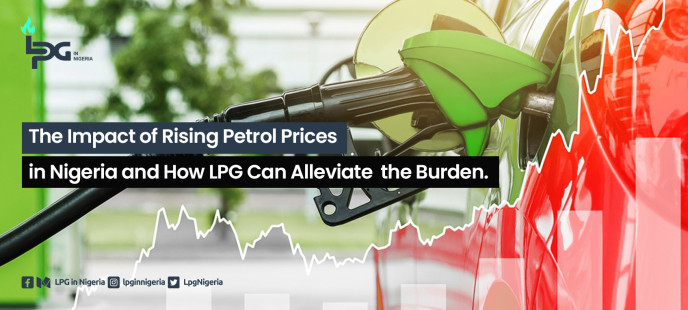- 3486
- 2
Sharing Ideas and Updates on LPG in Nigeria and related information to enable effective collaboration within the LPG Value Chain
The Impact Of Rising Petrol Prices In Nigeria And How LPG Can Alleviate The Burden

As Nigeria grapples with rising petrol prices, the need for alternative energy sources has never been more urgent. The recent spike in petrol prices is causing a ripple effect across various sectors, making everyday costs much higher for the average Nigerian. With this increase in fuel prices, households and businesses alike are exploring ways to minimize energy expenses, particularly when it comes to powering generators, which are essential due to the country’s unreliable electricity supply.
Petrol Price Hikes: What It Means for Nigerians
The continuous increase in petrol prices is a direct result of global market forces, the removal of subsidies, and other economic factors. Nigerians, who rely heavily on petrol to power their cars, tricycles, and generators, are feeling the pinch. The costs of transportation, food, and even small business operations have all been pushed higher due to these price hikes.
For most businesses and homes, the petrol generator remains the main source of backup electricity. However, with the rising cost of petrol, running these generators has become significantly more expensive, further straining household budgets and the operations of small- and medium-sized businesses.
LPG as a Solution for Fuelling Generators
Liquefied Petroleum Gas (LPG) offers a sustainable alternative to petrol for powering generators, and many Nigerians are beginning to take note of its potential cost-saving benefits. We recently had a survey across our social media platforms and found that a good number of LPG users have indeed started using it as a source of fuel for generators.
Here’s how LPG can help alleviate the burden:
1. Cost Savings:
With petrol prices fluctuating, LPG remains a more affordable fuel option. The conversion costs for using LPG as a fuel source for generators are manageable. Once converted, LPG generators can save up to 50% on fuel costs compared to petrol.
2. Cleaner and More Efficient:
LPG is a cleaner-burning fuel compared to petrol, producing fewer emissions and reducing environmental harm. This is particularly beneficial in areas with high generator usage, as it lowers air pollution and contributes to a healthier environment. Moreover, LPG burns more efficiently, providing longer operating hours per unit of fuel.
3. Quicker ROI:
Investing in an LPG-powered generator offers a relatively fast return on investment (ROI). Depending on the frequency of generator usage, the typical time to recover the initial investment is around 150 to 200 hours of operation, which could equate to just a few months in high-use households or businesses.
4. Stable Pricing:
Unlike petrol, which is subject to sudden price hikes, the price of LPG is relatively more stable. This allows individuals and businesses to better plan their energy expenses without fear of abrupt cost increases. As more Nigerians adopt LPG for their energy needs, the demand for petrol will decrease, potentially stabilizing petrol prices in the long term.
Case Study: LPG vs Petrol for Generators
Let’s consider the following scenario: A small business operating a petrol generator for 8 hours a day at high daily running costs. If this business were to switch to an LPG generator, it could cut those expenses by 50%— a significant savings, especially over time. By reducing their energy overheads, businesses can reinvest in growth or pass those savings onto customers, making LPG a wise choice.
The Role of Government and Private Sector
As petrol prices continue to rise, both the Nigerian government and private sector stakeholders have a role to play in promoting the adoption of LPG. Awareness campaigns on the benefits of LPG, easier access to conversion services, and incentives for businesses to switch to LPG could accelerate this transition. Moreover, reducing tariffs on LPG imports and equipment could further bring down the cost of switching from petrol to LPG.
The rise in petrol prices in Nigeria is putting a strain on both households and businesses, particularly in sectors where reliable power is critical. However, LPG presents an opportunity to mitigate these rising costs. Its affordability, efficiency, and cleaner environmental footprint make it a viable alternative to petrol, especially for fueling generators. With a quick ROI and long-term savings, adopting LPG could be a game-changer in reducing the economic impact of rising fuel prices in Nigeria.
For more insights on LPG and how you can make the switch, stay connected with us through our blog and social media platforms.
















Wahab Afolabi
30 October 2024 - 07:41amGood girl you are.
Reply